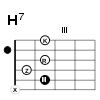Gitarre: Liedbeispiel 12g
Midnight Special[Bearbeiten]
Country Blues Text: Ein Fragment des Liedes wurde 1904 dem Soziologen Howard Odum per Post zugesandt, welches er dann 1911 in einer Liedersammlung veröffentlichte. bearbeitet von Mjchael
The Midnight Special ist ein Gefängnislied, das in vielen Strafanstalten des Südens der USA bekannt war.
Oft wird von der Furcht gesungen, dass die Frau des Gefangenen ihn verlassen könnte. Meist wird den Kindern Ratschläge gegeben, einen besseren Weg einzuschlagen. Der Refrain besingt die Lichter des Personenzuges "Midnight Special", der an dem Gefängnis vorbei fährt.
Die folgenden Strophen gehören zu den ältesten bekannten Versionen dieses Liedes und sind von Dave Cutrell (1926), Sam Collins (1927), Otto Gray's Oklahoma Cowboys (1929) und Lead Belly (1934).
Dieses Lied wurde von ABBA, The Beatles, Creedence Clearwater Revival, Little Richard, Pete Seeger, The Kingston Trio, Eric Clapton, Harry Belafonte, Bob Dylan, Kiss, Manfred Mann, Genesis, Fleetwood Mac und noch vielen anderen gecovert. Als Strophen gibt es sowohl Zwei- als auch Vierzeiler. Sogar Dreizeiler kommen vor. Der Refrain wird (vor allem zum Ende hin) oft mehrfach hintereinander gesungen.
Akkorde[Bearbeiten]
| Gitarre | Ukulele (adf#h) | |||||||
|---|---|---|---|---|---|---|---|---|
  
|
|
Midnight Special[Bearbeiten]
- 1
- [E]When you get up in the[A]morning when the ding dong[E]ring
- You make it to the[H7]table, see the same old[E]thing.
- Ain't nothing on the[A]table, but the pots and the [E]pans
- Say anything a-[H7]bout it, have trouble with the[E]man
- Chorus
-
- Let the Midnight[A]Special shine your light on[E]me.
- Let the Midnight[H7]Special shine your ever-living lights on[E]me.
- 2
- Yonder comes a Little[A]Nora. How do you[E]know?
- I know her by the[H7]apron, and the dress she[E]wear.
- Umbrella on her[A]shoulder, piece of paper in her[E]hand,
- Looking for some[H7]sergeant to release her[E]man.
- 3
- I never had the[A]blues so, in all my life[E]before,
- Than when my baby[H7]left me, at the jailhouse[E]door.
- Oh, she left me[A]crying, the tears rolled down her[E]face.
- Says, "I'd rather see you[H7]dead, boy, than in this[E]place."
- 4
- When you go to the[A]city, boys, you better have the[E]kale,[1]
- Or the law, they'll ar-[H7]rest you, and they'll put you in[E]jail.
- The judge he'll[A]fine you, they'll shake you[E]down,
- If you haven't got the[H7]money, boys, you're jailhouse[E]bound.
- 5
- If you got a good man,[A]woman, you better keep him at[E]home,
- For those city[H7]women won't leave him[E]alone.
- They'll paint and[A]powder, they sure look[E]swell,
- And the first thing[H7]you know, woman, your man's gone to -uh- sing-[E]ing
Der Autor ist vor über siebzig Jahren verstorben. Daher bestehen keine Urheberrechtsansprüche mehr an diesem Werk.
- ↑ Grünkohl umgangssprachlich für Geld (vgl. unser "Kohle"). Der Begriff spielt auf die grüne Farbe der Dollarnoten an.




